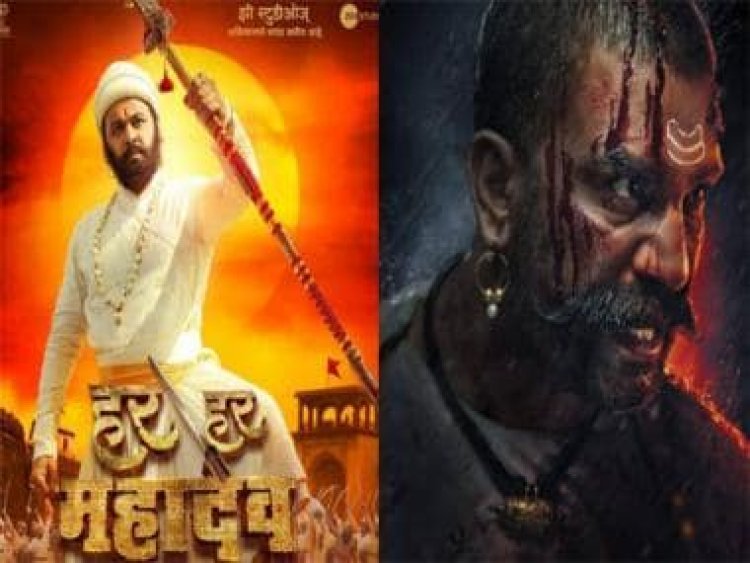Har Har Mahadev is the best historical since Bajirao Mastani
Har Har Mahadev is the best historical since Bajirao Mastani

There are some films that bowl you over by their seductive grandeur. Rarely do we see a historical that doesn’t turn into a show of light and sound signifying the director’s show of strength, and nothing more than that.
Abhijeet Shirish Deshpande’ s Har Har Mahadev (which contrary to its title, is not a mythological) doesn’t flex its felicity at flamboyance unnecessarily. In other words, this costume drama is not the visual equivalent of a gym session. It is one from the heart, passionate and poignant and never willing to show its budgetry constraints (I am told the entire budget of the film is less than what Ranveer Singh and Deepika Padukone’s costumes cost in Bajirao Mastani).
Director Deshpande tells the story of the soldierly brotherhood between Chhatrapati Shivaji Maharaj (Subodh Bhave) and his chief of army Baji Prabhu Deshpande (Sharad Kelkar) through the toughest of times when the country was under Islamic attack. The friendship between the two ideologically unaligned warriors is defined by some brilliant dialogues(written by Deshpande) who doesn’t mince words to play pacifist politics.
There in an illuminating off-hour tussle on the battle ground between an Islamic invader and some soldiers from Chatrapati Shivaji’s army. When the Islamic invader gets to know that one of Chatrapati Shivaji’s soldiers is named Ibrahim, he taunts about the Muslim in a Hindu army.
“Just by being circumcised, you don’t become a Muslim. If you read the Holy book carefully, you will know that Shivaji’s ideology matches perfectly with Islamic ideals,” is Ibrahim’s rabblerousing retort. The film doesn’t shy off provocative rhetoric during the breaks between the well-staged battle scenes.
The final battle, where Baji Prabhu Deshpande and his army of 300 soldiers vanquish 12,000 Islamic invaders at the historic Ghodkhind Pass is not only high-pitched, it is a marvel of mob recreation, with limbs flying and swords severing off heads and torsos like vegetables in a chef’s kitchen.
The Ghoking pass massacre takes up almost an hour of storytelling. It is bestial bloodied barbaric and brutal but also essential. Subodh Bhave’s Chatrapati Shivaji take up a large part of the dialogue space discussing with his army commander the need for a real soldier to look beyond regional and family interests toward a state of Sawaraj that Shivai devoted himself to.
Subodh Bhave and Sharad Kelkar play against each other with tactical spontaneity. These are actors who know how their craft inside-out but can and do conceal the skills that go into the performance. Also, I must add that Bhave and Kelkar embrace the periodicity with nil awkwardness. How inauthentic did Hrithik Roshan’s body language appear in Jodhaa Akbar? Bhave and Kelkar and the rest of the excellent cast look like they were born in those authentic but never over-the-top costumes.
Among this lengthy epic’s many virtues, I also liked the importance given to the womenfolk during wartime. While the men are out fighting it is the women who have to keep the kitchen fires burning and fob off unwanted advances by lecherous, over-empowered higher caste men. One of them brazenly declares he has raped sixty women, as rape is not illegal.
The most delicately drawn sequence in the film is the one between Chatrapati Shivaji and his terminally ailing wife (Sayli Sanjeev), who pretends to be well during her husband’s visit home so that he doesn’t lose his primacy on the battle field.
Baji Prabhu Deshpande confesses at some point that he joined Chatrapati Shivaji’s army only to win his sullen son’s respect. From the individual soul, emerges some of the greatest battles of our times. Har Har Mahadev captures the humane underbelly of the 17th century battles. The film draws a nimble sturdy balance between the battlefield and the home ground.
It is a great piece of cinema, not only for its panoramic cinematography (Tribhuvan Babu Sadineni) and crackerjack editing (though long, the battle sequences seem seamless in their persuasive propulsion) but primarily for its determination to hold fort without pomp or prejudice.
Subhash K Jha is a Patna-based film critic who has been writing about Bollywood for long enough to know the industry inside out. He tweets at @SubhashK_Jha.
Read all the Latest News, Trending News, Cricket News, Bollywood News, India News and Entertainment News here. Follow us on Facebook, Twitter and Instagram.
What's Your Reaction?



























































